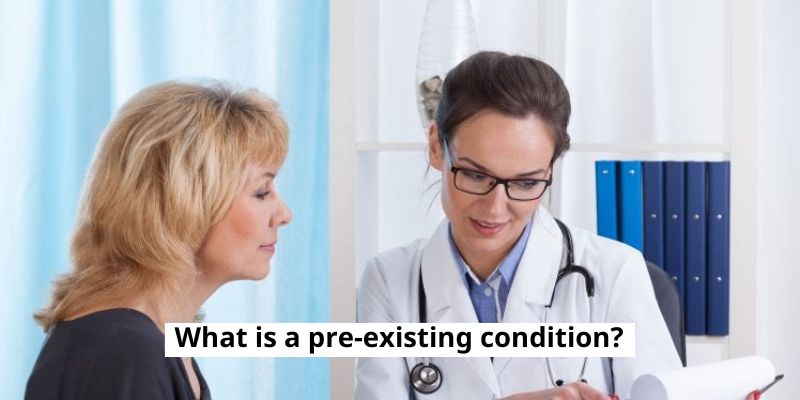Health insurance for pre-existing conditions – Best guide
Health insurance for pre-existing conditions – Best guide by topfoodss.com. You’re not alone whether you’re dealing with diabetes, high blood pressure, anxiety, or any other continuous medical problem. One or more of the following 10 prevalent chronic illnesses affects more than four in ten Canadians over the age of 20.
Fortunately, many illnesses may be successfully treated with medicine or other treatments. The drawback is that government healthcare programs only pay for prescription medications for select vulnerable populations, such elderly and people receiving social assistance. Therefore, you must pay for them out of your own cash unless you have enough coverage through employer perks or private health insurance.
Contents
- 1 What is a pre-existing condition?
- 2 What does it cover?
- 3 Note when buying health insurance for pre-existing conditions
- 3.1 1.Pre-existing condition health insurance might have different terms and restrictions.
- 3.2 2. You must always mention any existing medical conditions.
- 3.3 3. You should declare any pre-existing conditions before buying a health insurance coverage.
- 3.4 4. Pre-existing conditions are not always covered by health insurance.
- 3.5 5. Pre-existing conditions have a waiting time.
- 3.6 6. In rare circumstances, the waiting time may be waived.
- 3.7 7. Your health insurance policy’s premium may be impacted by a pre-existing condition.
- 3.8 8. Your application for a health insurance coverage may be denied by the insurer.
- 4 Conclusion
What is a pre-existing condition?
A pre-existing condition is any accident, ailment, or condition that occurs at the time an insurance policy becomes effective. Examples include diabetes, high blood pressure, high cholesterol, anxiety, depression, and asthma.

Is there health insurance that covers pre-existing diseases, you might be wondering? The good news is that you may still get comprehensive health insurance at a reasonable price. Simply opt for an insurance policy that guarantees guaranteed acceptance, like CoverMe Guaranteed Issue Enhanced.
What does it cover?
Individual health insurance may cover the following in addition to prescription drugs:
- dental treatment, such as cleanings, fillings, checkups, and oral surgery
- licensed practitioners of acupuncture, chiropractic, and massage
- Vision care services include contact lenses, laser eye surgery, and prescription eyeglasses.
- Mental health and therapy
- Nursing
- Ambulance
- Emergency medical travel
- Medical equipment and supplies
Note when buying health insurance for pre-existing conditions
1.Pre-existing condition health insurance might have different terms and restrictions.
Depending on the health insurance for pre-existing conditions policy, kind of coverage, riders, insurance firm, etc., the pre-screening procedure, waiting time, list of pre-existing conditions, etc. may vary. Most health insurance for pre-existing conditions companies will ask you to have a medical exam, after which you will be given a policy option. Some insurers may also take into account your age and medical history. Therefore, before choosing a medical insurance plan, you must review the purchasing procedure and the terms and conditions.
2. You must always mention any existing medical conditions.
Hiding facts or giving the health insurance for pre-existing conditions company false information will simply make matters more difficult for you. Health insurance for pre-existing conditions companies maintain the right to deny your claim and terminate your coverage if a pre-existing ailment is not disclosed. In an emergency, this may be grueling. As a result, it is in your best advantage to always be truthful and disclose to the insurer all significant health information at the time of purchase.

3. You should declare any pre-existing conditions before buying a health insurance coverage.
Many consumers believe that declaring a pre-existing condition after buying a medical insurance plan will result in a cheaper premium and enable them to save more money. However, the health insurance for pre-existing conditions company has the right to terminate your coverage at any moment if you are proven to have lied on purpose in your policy paperwork.
4. Pre-existing conditions are not always covered by health insurance.
Pre-existing conditions are not always covered by health insurance coverage. You might not receive any protection from certain illnesses under some policies. As a result, you must check with the health insurance for pre-existing conditions provider at the time of purchase and make an informed choice of plan.
5. Pre-existing conditions have a waiting time.
The fundamental idea behind the waiting period is that you cannot use health insurance for pre-existing conditions right away after purchasing a coverage. The policyholder must wait for a certain period of time, which might be anything from 30 days to 4 years. The waiting period is the length of time during which the insurance provider will not pay out on a claim for a condition you already have. You would have to pay the costs in this situation out of your own money.
The first waiting period, which is the same for all kinds of health insurance for pre-existing conditions policies, is the first 30 days following the purchase of a healthcare plan. During this first waiting period, no insurance claims can be made for any type of therapy. After the waiting time has passed, a medical insurance plan will cover pre-existing conditions. The waiting period might differ between insurers and depend on the sickness kind, coverage, age, and other comparable variables. Usually, it might range from two to four years.

6. In rare circumstances, the waiting time may be waived.
On payment of a little additional premium, several health insurance for pre-existing conditions providers give customers the choice to have the waiting time provision removed. In the case of this choice, the waiting period’s length is either shortened or eliminated completely.
However, depending on how serious your condition is, the insurance provider may forego the payment. If your health is significant or you are in your advanced years, the insurance provider could also decline to give you this alternative. It is thus advisable to clarify this before moving forward with the purchase of health insurance.
A pre-existing ailment may affect your medical insurance plan’s premium. In comparison to applicants without medical issues, you would have to pay a greater premium if you had a pre-existing condition. Based on factors such as your disease, age, the scope of the insurance, etc., the precise premium amount would be chosen.
However, it’s crucial to remember that, regardless of how much the premium costs, you should never make up information regarding your medical history. By withholding information now, you might be able to save more money in the long run, but if your claim is denied and you are left paying for your medical expenses out of pocket, you might face astronomical charges later on.
8. Your application for a health insurance coverage may be denied by the insurer.
If you have diabetes, cancer, or have had previous heart attacks, the insurance provider may refuse to provide coverage for those conditions. In rare circumstances, you could be eligible for health insurance for pre-existing conditions, but it might exclude coverage for specific conditions over the whole term of the policy.
Conclusion
One of the most important financial instruments you should think about investing in for a safe financial future is health insurance. It is functional, adaptable, and reasonably priced. By securing your savings and ensuring the safety of your loved ones, it allows you to live stress-free. The features and coverage of your insurance plan, however, have a significant impact on its trustworthiness.
Therefore, be careful to choose a plan that meets your needs and includes coverage for a variety of pre-existing conditions so you never have to worry about money and can get the greatest medical treatment when you need it.



